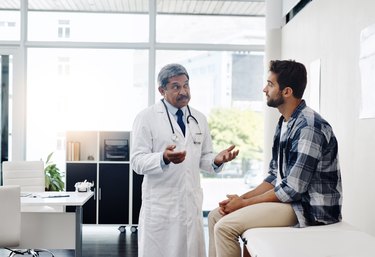
If you're in your younger years, getting a colonoscopy is probably the furthest thing from your mind. But colon — or colorectal — cancer rates in people younger than 50 are on the rise, according to the American Cancer Society (ACS).
Colorectal cancer is the second-deadliest cancer in the U.S., according to the ACS, and the rate for people under 50 has been steadily increasing, rising about 2 percent each year from 2011 to 2016, per a March 2020 article in CA: A Cancer Journal for Clinicians. Deaths have also increased in this age group, ticking up by 1.3 percent annually from 2008 to 2017.
Video of the Day
Video of the Day
What's going on? It may be that Westernized diets, higher rates of obesity and other factors may be contributing to colorectal cancers in younger people, Cassandra Fritz, MD, assistant professor in the division of gastroenterology at Washington University in St. Louis, tells LIVESTRONG.com.
Still, there's a bright spot in the statistics: Overall, "there has been a consistent decline in colorectal cancer cases and deaths over several decades," Paul Oberstein, MD, medical oncologist at Perlmutter Cancer Center at NYU Langone Health, tells LIVESTRONG.com.
One big reason? Higher rates of colonoscopy, a screening test used to detect colorectal cancer.
So, when should you get screened? We'll outline the guidelines below, along with five cases where you might want to get tested before you hit the official screening age.
Tip
Always talk to your doctor about your individual risk for colon cancer and when you should be screened.
At What Age Should You Be Screened for Colon Cancer?
Start at age 45, according to the U.S. Preventative Services Task Force. You should be screened until age 75, and then talk to your doctor from ages 76 to 85 to decide whether you need to continue.
"These screening recommendations are for people who are of average risk with no family history of the disease, Michael Sapienza, chief executive officer of the Colorectal Cancer Alliance, tells LIVESTRONG.com. (If you don't know your risk, you can take the Alliance's short quiz at GetScreened.org.)
Colorectal cancer screenings can be done in a variety of ways, including getting a colonoscopy and taking a stool test, like the fecal immunochemical test (FIT), notes the Centers for Disease Control and Prevention (CDC).
If you're of average risk, you may be able to take an at-home stool test (like FIT), Sapienza says. Your choice in tests depends on your risk assessment, preference and access to care.
The Colorectal Cancer Alliance also offers support and financial assistance programs to help you find affordable or free care.
Discuss the options that work for you with your primary care physician.
"Each test has its risks and benefits, but the colonoscopy is considered the gold-standard," Dr. Oberstein says.
The benefit of a colonoscopy is two-fold: "A colonoscopy detects cancer early before it spreads or metastasizes and can therefore still be cured," Dr. Oberstein says. "In addition, precancerous lesions called polyps can develop in the lining of your colon, and these are often precursors to cancer. If you remove the polyp, you can prevent cancer."
Still, there are times when you may need to be screened for colorectal cancer earlier than age 45. Here are five.
1. You Have Blood in Your Stool
Blood in your stool is a red-flag symptom of colon cancer. "Anyone who has blood in their stool should at least talk to their doctor," Dr. Oberstein says.
The presence of blood can be due to hemorrhoids (a swollen vein in your anus or rectum that can bleed, according to the Mayo Clinic), so it's not necessary to assume you have colon cancer because of some red on your toiler paper. However, there is reason to take the symptom seriously and see your health care provider.
Per the CDC, other common bowel movement-related symptoms of colorectal cancer include:
- Change in bowel habits
- Diarrhea
- Constipation
- A feeling that you're not having a "complete" bowel movement
- Abdominal pain
2. You’re Newly Anemic
Anemia occurs when your body is lacking healthy red blood cells, according to the National Heart, Lung and Blood Institute (NHLBI). This can happen for a variety of reasons, like not eating enough iron-rich foods or having a heavy period, but it can also be a symptom of slow bleeding from colon cancer, Dr. Oberstein says.
"I wouldn't automatically order a colonoscopy every time, but it's important to have this discussion and keep in mind the potential need for a colonoscopy," he says.
Symptoms of anemia include the following, per the NHLBI:
- Feeling weak and tired
- Paleness
- Shortness of breath
- Headache
- Chills
- Feeling dizzy or fainting
- Jaundice, or yellow skin
Your doctor can diagnose anemia, usually through a physical exam and blood test.
3. You’ve Had Unexplained Weight Loss
If you've been noticing your clothes have gotten baggier or the scale is creeping downward — and you haven't tried to lose weight — something may be amiss with your health.
Of course, there are a variety of conditions that can cause unexplained weight loss — colorectal cancer is just one of them. Still, it's worth a trip to the doctor.
"The earlier we can catch colorectal cancer, the better the likely outcome," Dr. Fritz says.
Unintentional weight loss is defined as losing more than 5 percent of your body weight over the past six months to one year, according to an April 2018 study in Molecular and Clinical Oncology. (If you don't weigh yourself, then needing to wear a different size in clothes and a family or friend validating your weight loss is also enough.)
The study focused on people with colon cancer, finding that about half had lost weight, with the highest rates of weight loss among those with more advanced cancers.
4. You Have a Family History of Colorectal Cancer
Talk to your family. It's important to know if you have a first-degree relative (that is, a parent or sibling) who has been diagnosed with colorectal cancer, and you should also be aware if they had any abnormal polyps, too, Dr. Oberstein says.
That last part is often less discussed. ("How did your last colonoscopy go?" isn't exactly dinner table conversation.)
If you do have a first-degree relative with a history of colorectal cancer (before the age of 60) or advanced polyps, you should be screened 10 years earlier than their age at diagnosis, Dr. Fritz says. For example, if your dad was diagnosed with colorectal cancer at age 50, then you should begin screening at age 40.
5. You Have Inflammatory Bowel Disease (IBD)
The two main types of IBD include Crohn's disease and ulcerative colitis.
"Both of these diseases increase the risk of colorectal cancer and require earlier screening below age 45," Dr. Oberstein says.
People with IBD, especially those with ulcerative colitis, may have more than a 60 percent higher rate of colorectal cancer compared to the general population, according to a December 2021 article in the Journal of Crohn's and Colitis. (It may be that chronic inflammation from the disease puts you at risk for developing this type of GI cancer.)
"Everyone with IBD should see their doctor for guidance about starting screening," Dr. Oberstein says.
The Bottom Line
Prepping for a colonoscopy is not the most fun thing you'll do all week. However, one of the best reasons to get screened is this: "As long as we find it early, colorectal cancer is a very treatable disease," Dr. Fritz says.
The bottom line, she says: Talk to your family, talk to your doctor and don't be afraid to get a colonoscopy or another screening test that's right for you.
- American Cancer Society: "Key Statistics for Colorectal Cancer."
- American Cancer Society: "Colorectal Cancer Risk Factors."
- CA: A Cancer Journal for Clinicians: "Colorectal Cancer Statistics, 2020."
- Centers for Disease Control and Prevention: "What Should I Know About Screening?"
- Centers for Disease Control and Prevention: "Colorectal Cancer Screening Tests."
- Mayo Clinic: "Hemorrhoids."
- Centers for Disease Control and Prevention: "What Are the Symptoms of Colorectal Cancer?"
- National Heart, Lung, and Blood Institute. "What Is Anemia?"
- Molecular and Clinical Oncology: "Prognostic significance of unintentional body weight loss in colon cancer patients."
- Journal of Crohn's and Colitis: "Inflammatory Bowel Disease-Associated Colorectal Cancer: Translational Risks from Mechanisms to Medicines."
Is this an emergency? If you are experiencing serious medical symptoms, please see the National Library of Medicine’s list of signs you need emergency medical attention or call 911.


